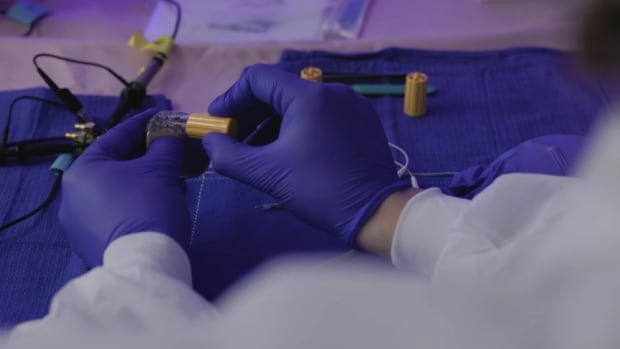As It Happens7:01Not everyone can afford a pacemaker, so these doctors are recycling them
It’s been more than a decade since a man walked into a Michigan hospital and made the unusual request to donate his late wife’s pacemaker.
She had the brand new device implanted just a few months before she died of unrelated causes, says Dr. Thomas Crawford, cardiac electrophysiologist at the University of Michigan.
“He said, ‘Well, my wife was very much into recycling, and I really hope that you can really use it for somebody else,” Crawdord told As It Happens host Nil Kӧksal.
“We didn’t think we could use it because it’s not legal in the United States to reuse a pacemaker. But it did get us thinking about whether we could use this device anywhere else.”
Now Crawford and his colleagues are sharing early results of their randomized trial of nearly 300 patients across seven countries showing that used pacemakers, when properly sterilized and implanted, work just as well as new ones, and pose no greater risk of infection.
The findings — presented last week at an American Heart Association conference in Chicago — are preliminary, and have not yet been published in a peer-reviewed journal. But doctors who work with pacemakers are cautiously optimistic about the potential impact of this research.
“These researchers are to be commended,” Dr. Calum Redpath, a cardiologist at the University of Ottawa Heart Institute who wasn’t directly involved in the research, told CBC. “Hopefully, we are able in the future to be able to offer this service to low-and middle-income countries.”
Millions can’t afford life-saving device
Pacemakers are small, surgically implanted, battery-powered devices that prevent the heart from beating too slowly. They save and extend lives and dramatically reduce suffering, Crawford says.
In both Canada and the U.S., pacemakers are approved as single-use only devices, in line with manufacturers’ instructions.
But in less wealthy countries, not everyone who needs a pacemaker can afford one.
“Unfortunately, in many countries … the expense of a pacemaker has to be borne by the family or the patient, and it has to be rendered before the procedure is done,” Crawford said.
The University of Michigan’s Frankel Cardiovascular Center estimates that every year, between one and two million people die worldwide due to a lack of access to pacemakers and defibrillators.
A Swedish man benefits from a lifesaving device originally developed by Canadian John Hopps.
That’s where the My Heart Your Heart project comes in. The University of Michigan program collects and sterilizes pacemakers from hospitals and funeral homes for use in low- and middle-income countries.
Currently, they are conducting a clinical trial of 298 patients in Sierra Leone, Venezuela, Nigeria, Kenya, Paraguay, Mexico and Mozambique.
Half the participants received brand new pacemakers between 2022 and 2024, while half received refurbished ones that were determined to be in good condition with at least five years of battery life remaining.
They found that 90 days after receiving the devices, there were no significant differences in the health outcomes of both groups.
There were five cases of infection at the implant site, three among recipients of new pacemakers, and two among those who received used ones. Three patients died, but for reasons unrelated to the devices.
“It shows that the devices do not have any greater risk of infection or malfunction,” Crawford said.
The findings echo those from a similar study out of Mexico in 2017 and another by researchers in Montreal published in 2020.
Considering the ethics
Redpath, director of Ontario’s Cardiac Device Clinic, says that since the 2000s, Canadian doctors have attached used pacemakers to patients’ hearts from outside of the body to help people with temporary heart blockages associated with conditions like Lyme disease and COVID-19.
But he doesn’t foresee a future where used pacemakers are surgically implanted in this country.
“It’s not that we don’t believe that these pacemakers aren’t good enough in Canada. It’s simply because there’s no economic drive. There’s no need for us to do that because we’re a wealthy country,” he said.
In order to implant a used pacemaker in Canada, a doctor would need a licence from Health Canada. The agency confirmed in an email to CBC that it has never issued one.
But Canada can, and has, been a donor country.
For decades, the Montreal Heart Institute has partnered with funeral homes in Quebec to send pacemakers to Mexico, Honduras, Guatemala, Cuba, Ecuador and the Dominican Republic.
Redpath says he’s been involved in similar efforts in Ottawa, but it ultimately proved too logistically challenging.
In order to make this trial happen, Crawford says his team has worked with manufacturers, funeral homes, hospitals, regulatory agencies, as well as doctors and governments in recipient countries.
They also had to consider the ethical implications. If used pacemakers are not deemed safe for use in wealthy countries, why is it OK to use them in poor ones?
“There are obviously valid points on both sides of this argument,” Crawford said. “However, the use of a reconditioned pacemaker can really alter the patient’s life and improve their quality of life and extend longevity of their life.”
Redpath says he believes doctors have an ethical imperative to continue this work.
“Here is a legitimate and safe way to treat these patients who otherwise would not receive treatment,” he said.
Crawford says his team will publish further results of its clinical trial as it continues, and provide newly refurbished devices for the participants as needed.
They’re also hoping to do similar work with implantable cardiac defibrillators, which can cost three to four times as much as a pacemaker.
“We’re in it for the long haul,” he said.


